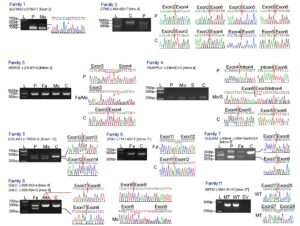Routinely used Whole Exome Sequencing (WES) in genetic diagnosis for monogenic disorders revealed numerous variants of uncertain significance (VUSs), which poses considerable problems for genetic counselling and clinical management. In fact, many disease-causing variants have been reported to resulting in aberrant gene splicing. Therefore, for VUSs suspected to cause aberrant splicing, additional evidence can be supplemented for pathogenicity reclassification by splicing patterns assessment on RNA.
We recruited 49 VUSs from 48 patient families and assessed the splicing patterns of the variants . Twelve variants were found to disrupt splicing function and reclassified as likely pathogenic variation. Based on the results obtained, couples opted for different reproductive interventions to conceive a child.
This study highlights that RNA splicing analysis can contribute to the reclassification of a significant proportion of VUSs. It is worth for promoted application in medical practice. (By Dr. Congling Dai, https://jmg.bmj.com/content/early/2022/02/03/jmedgenet-2021-108013 )
